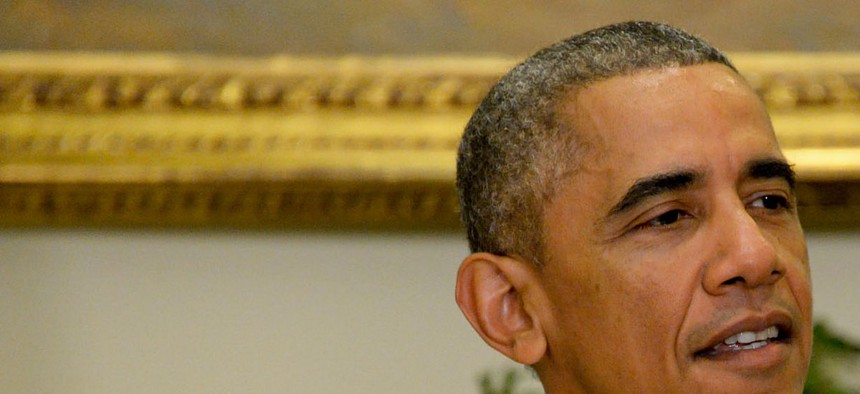
Veterans Affairs Department
Obama Can’t Avoid Keystone XL Anymore
Court decision puts decision on controversial pipeline back in president's lap
President Obama is running out of excuses on Keystone XL.
For Obama, the controversial proposed oil pipeline has been a political headache for six years, landing at the center of the debate over climate change and American energy security. It's been easier for the president to duck a decision than to decide.
The White House's line: It's waiting for the State Department to decide if the project is in the national interest. And that review was put on hold last spring pending the outcome of a Nebraska Supreme Court case on the proposed route through the state.
Friday, the Nebraska court ruled that the pipeline path is valid, and that means Obama is back to the same crossroads where he was before—and faced with a decision that might decide his environmental legacy.
Confronted by stiff Republican opposition in Congress, Obama has pushed ahead with executive action to create strict vehicle fuel-efficiency standards, along with landmark regulations to rein in air pollution from the nation's fleet of power plants. Pollution cuts expected to be achieved by the power-plant rule alone will vastly outweigh the environmental consequences of Keystone XL, and Obama is hoping that his name will go down in history as a result of the rule.
But despite efforts to shore up a green legacy, Obama continues to feel pressure from environmentalists to reject Keystone. Green groups have worked hard to make the pipeline a litmus test of the president's commitment to fighting climate change and are quick to remind Obama at every turn.
For now, the White House isn't changing its tune.
"Our posture and our position hasn't changed. This is a process that still underway at the State Department. I don't have any updates for you," White House deputy press secretary Eric Schultz told reporters Friday. "As you know [the pipeline] is undergoing rigorous review, and we're going to wait for that review to be completed before the president makes any decisions."
The State Department has also declined to provide a timeline for when its review will be complete.
Opposition to Keystone has become a potent rallying cry for activists, who say that construction of the pipeline would exacerbate global warming. And now that the Nebraska court decision has been decided, environmentalists are looking squarely at Obama to reject the pipeline.
"The decision is now in President Obama's hands," saidJane Kleeb, the director of Bold Nebraska, an anti-pipeline coalition.
"President Obama's climate legacy depends on this decision," said Jamie Henn, a spokesperson for environmental group 350.org. "Confronting climate change requires more than saying 'yes' to clean energy, you also have to say 'no' to fossil fuels."
Obama's problem: He's got other constituents to worry about. Labor unions and business groups strongly support construction of the project, saying it would create jobs and spur the economy. Whatever decision he makes, the president is sure to alienate key supporters.
Terry O'Sullivan, the general president of the Laborers' International Union of North America called on the president to swiftly approve KXL on Friday.
"The president should immediately resume the National Interest Determination that he needlessly suspended last year," O'Sullivan said. "It's time to move forward to unlock energy and good construction careers."
"President Obama has no more excuses left to delay or deny the Keystone XL pipeline," said Jack Gerard, the president and CEO of the largest trade association for the oil and gas industry the American Petroleum Institute.
The White House also faces pressure from Congress to act. The House voted 266-153 to approve Keystone XL on Friday afternoon, with a vote expected in the Senate in the coming weeks. Congress is expected to approve legislation authorizing the project, but the White House issued a veto threat earlier this week.
White House press secretary Josh Earnest fell back on the administration's usual retort, saying during a press briefing on Tuesday that the administration wants to complete its own review of the project without interference from Congress. The veto warning also cited uncertainty created by the Nebraska court case.
The administration reaffirmed on Friday that the veto threat still stands, despite the Nebraska court decision.
But with a legal route for the pipeline cleared in Nebraska, it looks unlikely that Obama can let the clock run out on a decision.
Once the State Department review of Keystone XL grinds back to life, Secretary of State John Kerry will make a recommendation on the project. Once Kerry weighs in, a final decision will be in the hands of the president.
The president has sounded increasingly unlikely to approve the project in a series of public comments delivered in recent weeks.
Obama has said he will not approve the project if it significantly exacerbates climate change. A State Department analysis said the pipeline would have only a minimal environmental impact. But the president raised concern over the project's potential to worsen pollution at an end-of-the year press conference.
"I want to make sure that if, in fact, this project goes forward, that it's not adding to the problem of climate change, which I think is very serious and does impose serious costs on the American people," the president said.
Obama also downplayed Keystone XL's potential for job creation.
"Now, the construction of the pipeline itself will probably create a couple thousand jobs…. But when you consider what we could be doing if we were rebuilding our roads and bridges around the country ... we could probably create hundreds of thousands of jobs, or a million jobs. So if that's the argument, there are a lot more direct ways to create well-paying American construction jobs," he said.
NEXT STORY: How HR Departments Can Assert Their Value







